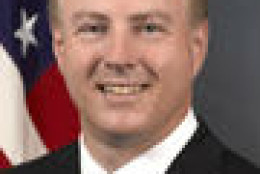Defense Department
-
The White House defense budget request is $38 billion over the limits set by sequestration. In an attempt to balance the increased funding, the Pentagon is pursuing pay and benefits reform, and another round of BRAC.
February 02, 2015 -
The White House budget request for fiscal 2016 is out. The Obama administration is hoping for a future without sequestration, and the Defense Department is defending that concept. On In Depth with Francis Rose, Federal News Radio's Sean McCalley breaks down the numbers behind the defense spending plan.
February 02, 2015 -
President Obama's 2016 budget request for the Defense Department is $38 billion more than the Budget Control Act calls for. He's asking for $534 billion, but any number over $498 billion will trigger sequestration. Roger Zakheim is counsel at Covington and Burling, former general counsel and deputy staff director of the House Armed Services Committee and also former deputy assistant secretary of Defense. In Depth with Francis Rose asked him if the budget is as "dead-on-arrival" as Republicans in Congress make it sound.
February 02, 2015 -
The Defense Department is starting a new long-range research and development initiative. It's intended to deliver technologies capable of providing the next generation of dominance on the battlefield. A similar initiative in the 1970s resulted in the creation of technology offsets like smart munitions and stealth aircraft. Stephen Welby is the Deputy Assistant Secretary of Defense for Systems Engineering. On the Federal Drive with Tom Temin, he explained what separates this initiative from the department's existing R&D testing.
February 02, 2015 -
The Obama administration already has made clear that it will request a budget Monday which violates the automatic spending caps in existing law. But for DoD, the war accounts, which are exempt from the caps, may serve as a backup plan.
February 02, 2015 -
The Military Compensation and Retirement Modernization Commission came away from its huge task with a mixed bag of recommendations. Some of the 15 suggestions the experts revealed Thursday were obvious changes that have been needed for decades. Other recommendations are going to cause heartburn among military service members, retirees and their families, and on Capitol Hill. Federal News Radio Executive Editor Jason Miller tells In Depth with Francis Rose why the commission believes all of them are not only needed, but achievable.
January 30, 2015 -
A new analysis based on early media leaks of the Pentagon's 2016 budget request suggests DoD is using Afghanistan as a partial safety valve to once again ease the threat of sequestration. As Federal News Radio's Jared Serbu reports, the data is suggesting a pattern over the past few years.
January 30, 2015 -
Pentagon CIO sees renewed vigor in DoD's cloud migration path as an opportunity to raise the bar for the nation's overall cybersecurity, telling vendors he wants a much closer partnership with commercial cloud providers.
January 30, 2015 -
The nine-member Military Compensation and Retirement Modernization Commission submitted 15 recommendations to bring effectiveness and efficiency, and that would protect, maintain and improve benefits for the service members.
January 30, 2015 -
By JOSH LEDERMAN and ANDREW TAYLOR Associated Press WASHINGTON (AP) — Declaring an end to “mindless austerity,” President Barack Obama called for a surge in government spending Thursday, and asked Congress to throw out the…
January 30, 2015 -
The Defense Department submits seven legislative proposals to Capitol Hill to simplify its acquisition process. But don't call them reforms, says Frank Kendall, undersecretary of defense for acquisition, technology and logistics. Federal News Radio Executive Editor Jason Miller tells In Depth with Francis Rose to discuss what DoD is asking for.
January 29, 2015 -
The Pentagon's top IT official told vendors, DoD wants a much closer partnership with commercial technology providers, and it fully intends to move as much of its data as it can into commercially hosted environments. They'll do it as soon as officials figure out how to solve the cybersecurity implications. Federal News Radio DoD reporter Jared Serbu has more.
January 29, 2015 -
Sen. John McCain (R-Ariz.), the new chairman of the Senate Armed Services Committee, said his committee has more work to do before it draws up a broad acquisition reform package. But one element will be a more full-throated role for the uniformed military.
January 29, 2015 -
Frank Kendall, the undersecretary of Defense for acquisition, technology and logistics, told the House Armed Services Committee that a bunch of incremental changes could help DoD find success with its acquisitions more often. The seven legislative proposals address redundant documents and processes that the military needs help from Congress to get rid of and give program managers more time.
January 29, 2015 -
Sen. John McCain (R-Ariz.) said he intends to put acquisition reform language into this year's defense authorization bill. McCain said he's not sure yet what form that language will take but is sure of one thing: The uniformed chiefs of the military services need to be put back into the acquisition chain of command. Federal News Radio DoD Reporter Jared Serbu has the details.
January 28, 2015







